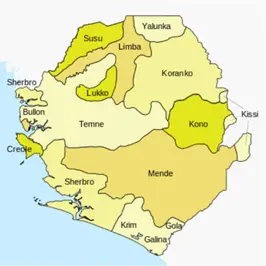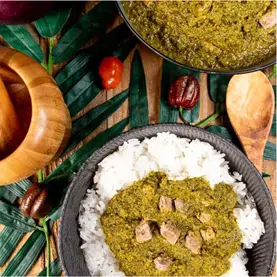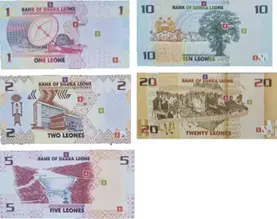BRIEF COUNTRY INFORMATION
All you need to know about Sierra Leone
Demographics
 Demographics
Demographics
Sierra Leone officially the Republic of Sierra Leone, informally Salone, is a country on the southwest coast of West Africa. It is bordered by Liberia to the southeast and Guinea surrounds the northern half of the nation. Sierra Leone has a tropical climate with a diverse environment ranging from savanna to rainforests, a total area of 71,740 km²and a population of 7,092,113 as of the 2015 census. The capital and largest city is Freetown. The country is divided into five administrative regions which are subdivided into sixteen districts.
Sierra Leone is a constitutional republic with a unicameral parliament and a directly elected president serving a five-year term with a maximum of two terms. Sierra Leone is a secular nation with the constitution providing for the separation of state and religion and freedom of conscience (which includes freedom of thoughts and religion). Muslims make up about three-quarters of the population, though with an influential Christian minority. Religious tolerance in the West African nation is very high and is generally considered a norm and part of Sierra Leone’s cultural identity.
Local People
 Local People
Local People
Sierra Leoneans are very welcoming and embrace foreigners who are interested in discovering their country and culture. The population is of majority Muslims and minority Christians and is considered being one of the most tolerant and peaceful countries in the world. You should however be advised to always ask before taking pictures of the locals, especially in rural areas of Sierra Leone. In urban cities, locals love to take selfies, and will probably want to share a selfie with you.
Our Language
 Our Language
Our Language
Sierra Leone’s official language is English. However, most of the locals speak Krio, a type of English creole. Krio is an easy language to understand and if you listen carefully, you could almost become fluent within a couple of months. Everyone in Freetown speaks Krio.
A few useful Krio sentences to get you around:
•• Hello, My name is… Una kushe, me name na…
•• How are you? How una dae do?
•• Fine, thank you. Fine, Tenki
•• Where can I find …? Usai ar go fen …?
•• How much is this? How much fo’ this…
•• Do you have….? You get….?
•• Please. Dooya
Within the interior of the country, different dialects spoken according to the different ethnic groups. Some examples would be Temne, Mende, Limba, Kono, Fula, Susu, Loko, Koranko, Sherbro,Mandingo and Krio.
The map displays the distribution of the ethnic groups in Sierra Leone.

Our Food
 Our Food
Our Food
Rice is the staple food of Sierra Leone and is consumed at virtually every meal daily. The rice is prepared in numerous ways, and topped with a variety of sauces made from some of Sierra Leone’s favourite toppings, including potato leaves, cassava leaves, crain crain, okra soup, fried fish and groundnut stew.
Along the streets of towns and cities across Sierra Leone, one can find foods consisting of fruit, vegetables and snacks such as fresh mangoes, oranges, pineapple, fried plantains, ginger beer, fried potato, fried cassava with pepper sauce; small bags of popcorn or peanuts, bread, roasted corn, or skewers of grilled meat or chicken.
Meals are often accompanied by ginger beer (typically homemade non-alcoholic drink made from pure ginger and sweetened with sugar), the local beer (Star beer), soft drinks or Poyo.
Poyo is a popular Sierra Leonean drink. It is a sweet, lightly fermented palm wine, and is found in bars in towns and villages across the country. Poyo bars are areas of lively informal debate about politics, football, basketball, entertainment and other issues.

Our Currency
 Our Currency
Our Currency
The currency is the Sierra Leonean Leone (SLL), commonly known as the “Leone”.
You can also easily convert US Dollars, British Pounds and Euro currencies through foreign bureau exchange offices, banks, in most of the hotels, and in the streets through “Dollar Boys.” However, items around the country are priced in Leones and it is much easier to pay using the local currency.
Ensure to always have some cash on you as many places do not accept credit cards, and in some instances the credit card device might not always be operational.
You may however safely draw money (Leone) from the ATM machines provided in different spots by various banks. Be advised that sometimes the ATM might run out of bank notes.

TRAVELLING TO SIERRA LEONE
All you need before travelling to Sierra Leone
Plan Ahead
 Plan Ahead
Plan Ahead
Sierra Leone is the hidden gem of West Africa. Its beaches and its country sides will just take your breath away.
Before travelling plan ahead what you might need:
• Valid passport (Valid 6 months after your return date)
• Visa (Currently it is possible to obtain it on arrival)
• Vaccination Card (Yellow Fever shot)
• COVID 19 entry requirements (Contact us for updates or visit www.travel.gov.sl)
We recommend you carry the below as well that might be useful during your trip:
• Anti-malaria treatments: There are several types of anti-malaria treatments, check with your doctor, which one is best suited for you
• Mosquito repellants body spray
• Sunscreen
• Sunglasses
• Travel insurance
Should you have questions or concerns feel free to contact our help desk
by mail on contact@ipctravel.com
or phone +232 77 777 774
Your Arrival
 Your Arrival
Your Arrival
Upon your arrival at the Lungi Airport, you will have three options to travel to Freetown:
1- By Boat
This is a fun way to start your trip. The water taxis are the main operators transferring passengers to and from Lungi. You will travel in air-conditioned motor boat that will take you to Freetown (Aberdeen area) within 25 to 30 min. travel time.
2- By Road
This is a great way to discover the Freetown rural area and have a first glimpse at Sierra Leone’s unique landscapes. Travelling by road will take you to Freetown within 2h30 to 3h00 time.
3- By Ferry Boat
If you are looking for a more cost-efficient route to travel to the airport, then you can use the Ferry. Available at two ports, the Kissy Ferry Terminal and at Government Warf. Even though it is not the fastest way to get to the airport, many people still prefer using this mode of transportation. Travel time duration is approximately 45 min.
Moving Around
 Moving Around
Moving Around
You can hire a 4X4 chauffeur-driven vehicle from IPC Travel. Our drivers have 5+ years of driving experience, are well acquainted with the terrain and English spoken.
Hotel taxis are also available at all major hotels, guesthouses, Lungi Airport and water taxi terminals.
Local taxis are available for hire but be ready to negotiate based on the duration of the trip.
Local taxis, mini buses “Poda-poda”, auto rickshaws “Kekeh” and commercial bikes “Okada” are available throughout the country for travelers on a tight budget and interested in immersing themselves in the local popular transport.
Your Visa
 Your Visa
Your Visa
All visitors entering Sierra Leone are required to hold a valid passport and a valid visa for entry with the exception of citizens from the Economic Community of West African States (ECOWAS) that do not require entry visa to Sierra Leone.
However, all other nationals require visa to enter the country. The visa can be obtained on arrival in Sierra Leone or through our offices, which facilitates your visa within 24 to 72 hours.
Giving Tips
 Giving Tips
Giving Tips
Tips are always appreciated. Whether this is to a waiter in a restaurant, or the person helping with your bags, taxis or commercial drivers. This is however discretionary and is not a requirement.





